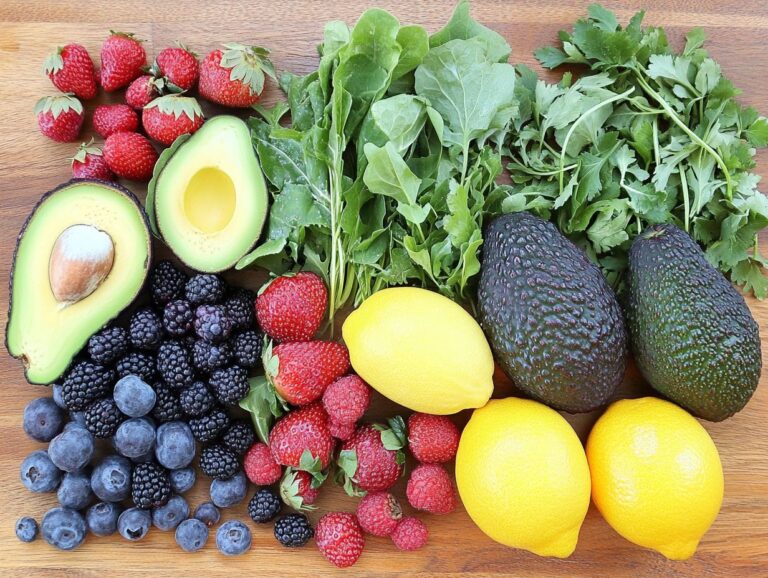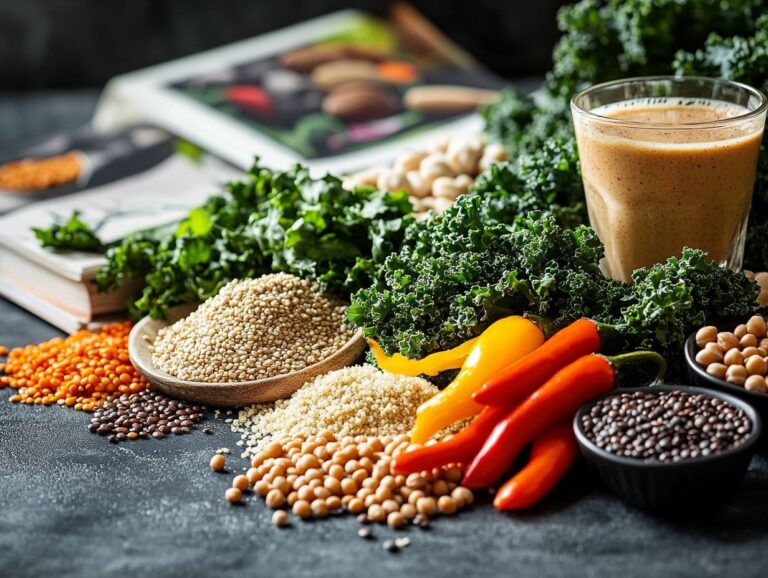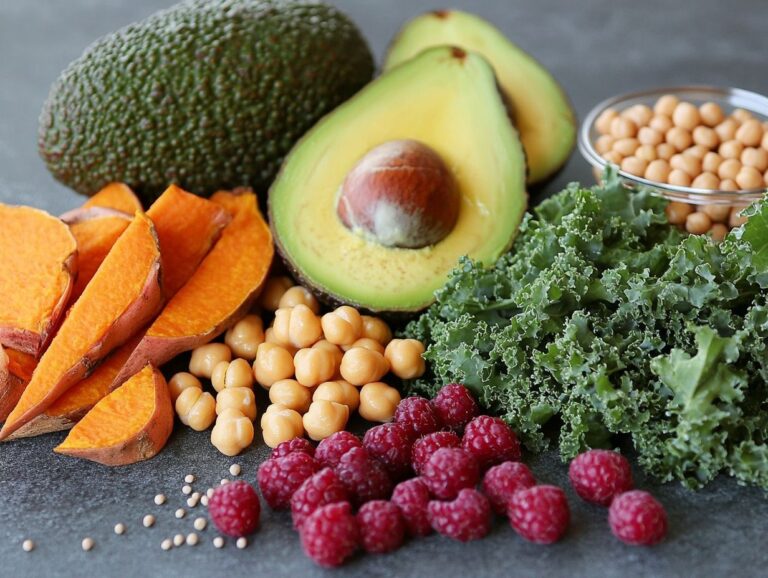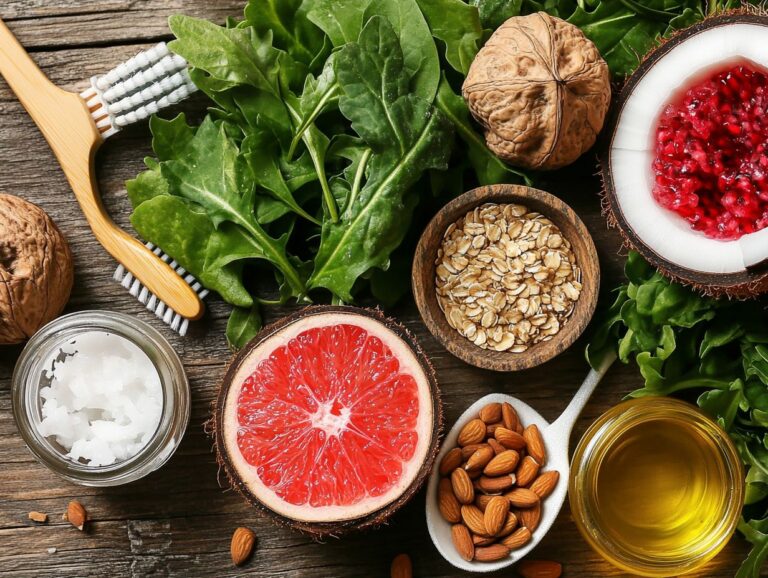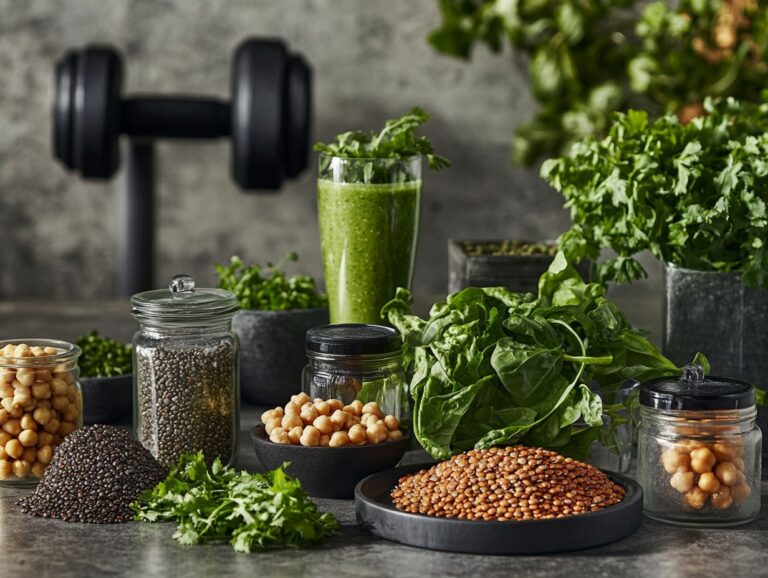Learn from the mistakes of others by avoiding common pitfalls that can hinder weight loss on a vegan diet. These challenges encompass everything from the convenience of processed foods to inadequate protein intake. In the following sections, we will explore these obstacles to weight loss on a vegan diet and provide practical solutions to help you achieve your goals. These tips are designed to assist everyone, from those who are new to plant-based eating to those who have already begun this journey, in reaching their objectives with confidence.
What Is a Vegan Diet?
 A vegan diet is a plant-based lifestyle that excludes all animal products, including meat, dairy, and eggs. This diet primarily consists of whole foods such as legumes, tofu, tempeh, fruits, and vegetables. Unlike a vegetarian diet, a vegan diet eliminates all animal-derived products, providing numerous health benefits and promoting weight loss. Many individuals adopt a vegan or vegetarian lifestyle due to ethical considerations regarding animal rights. It promotes the consumption of nutrient-dense foods that are high in fiber, vitamins, and minerals, aiming to provide various health benefits including weight loss, improved blood sugar control, and reduced heart disease and cancer risk. When followed properly, a vegan diet can contribute to weight loss, improved blood sugar control, and a lower risk of heart disease and cancer.
A vegan diet is a plant-based lifestyle that excludes all animal products, including meat, dairy, and eggs. This diet primarily consists of whole foods such as legumes, tofu, tempeh, fruits, and vegetables. Unlike a vegetarian diet, a vegan diet eliminates all animal-derived products, providing numerous health benefits and promoting weight loss. Many individuals adopt a vegan or vegetarian lifestyle due to ethical considerations regarding animal rights. It promotes the consumption of nutrient-dense foods that are high in fiber, vitamins, and minerals, aiming to provide various health benefits including weight loss, improved blood sugar control, and reduced heart disease and cancer risk. When followed properly, a vegan diet can contribute to weight loss, improved blood sugar control, and a lower risk of heart disease and cancer.
Why Do People Struggle to Lose Weight on a Vegan Diet?
While a vegan diet is often thought to promote weight loss, many individuals find it challenging to achieve their weight goals. This struggle can be attributed to several factors, including the consumption of processed foods, inadequate protein intake, overeating of healthy foods, nutrient deficiencies such as vitamin B12 and calcium deficiency, and insufficient meal planning and preparation. These issues can prevent the creation of a calorie deficit necessary for weight loss and may also hinder the intake of essential nutrients required for overall health.
1. Consuming Too Many Processed Foods
Processed foods are often high in unhealthy fats and sugars, which can lead to weight gain rather than weight loss. One of the primary reasons people struggle to lose weight on a vegan diet is the consumption of too many processed foods that are high in calories and low in essential nutrients. The lower fiber content and lack of healthy fats in these processed foods can lead to overeating and potential nutrient deficiencies, including vitamin B12 and omega-3 fatty acids, which may hinder weight loss efforts. For instance, vegan snacks like chips, cookies, and sugary drinks can enhance the enjoyment of a meal but offer little in terms of health benefits or satiety. Additionally, processed vegan products such as sausages often contain high levels of sodium and preservatives, undermining the advantages of a vegan diet. Relying on these options creates an imbalance in nutrition, as they frequently lack the essential vitamins and minerals needed to sustain energy levels and support metabolic functions. In contrast, consuming whole foods like fruits, vegetables, pulses, nuts, and seeds can enhance a vegan diet by providing adequate energy, protein, healthy fats, and complex carbohydrates, ultimately promoting weight loss and overall health.
2. Not Enough Protein
Inadequate protein intake poses a significant challenge for many individuals following a vegan diet, as they may struggle to obtain sufficient essential amino acids, which are crucial for muscle maintenance and overall health. This deficiency can often lead to increased hunger, making it more difficult to sustain the calorie deficit necessary for weight loss. Additionally, iron absorption can be another concern for vegans, making it important to pair iron-rich plant foods with vitamin C sources to enhance absorption. To ensure they receive adequate nutrients, those on a vegan diet should aim to incorporate a variety of high-protein plant foods, particularly:
- Including a variety of plant foods
- Managing protein intake
- Ensuring sufficient fiber intake
- Maintaining balanced healthy fats
- Incorporating regular exercise
- Legumes
- Soy products such as tofu and tempeh
- Whole grains such as quinoa, brown rice, and oats
Legumes like lentils, chickpeas, and beans are excellent sources of protein and also provide the added benefit of fiber, which promotes digestion and helps individuals feel full. Tofu and tempeh, made from soybeans, serve as ideal meat substitutes and offer a complete amino acid profile essential for muscle repair and growth. Nuts such as almonds and seeds like chia and hemp are also valuable protein sources that contribute to a balanced vegan diet.
3. Overeating on Healthy Foods
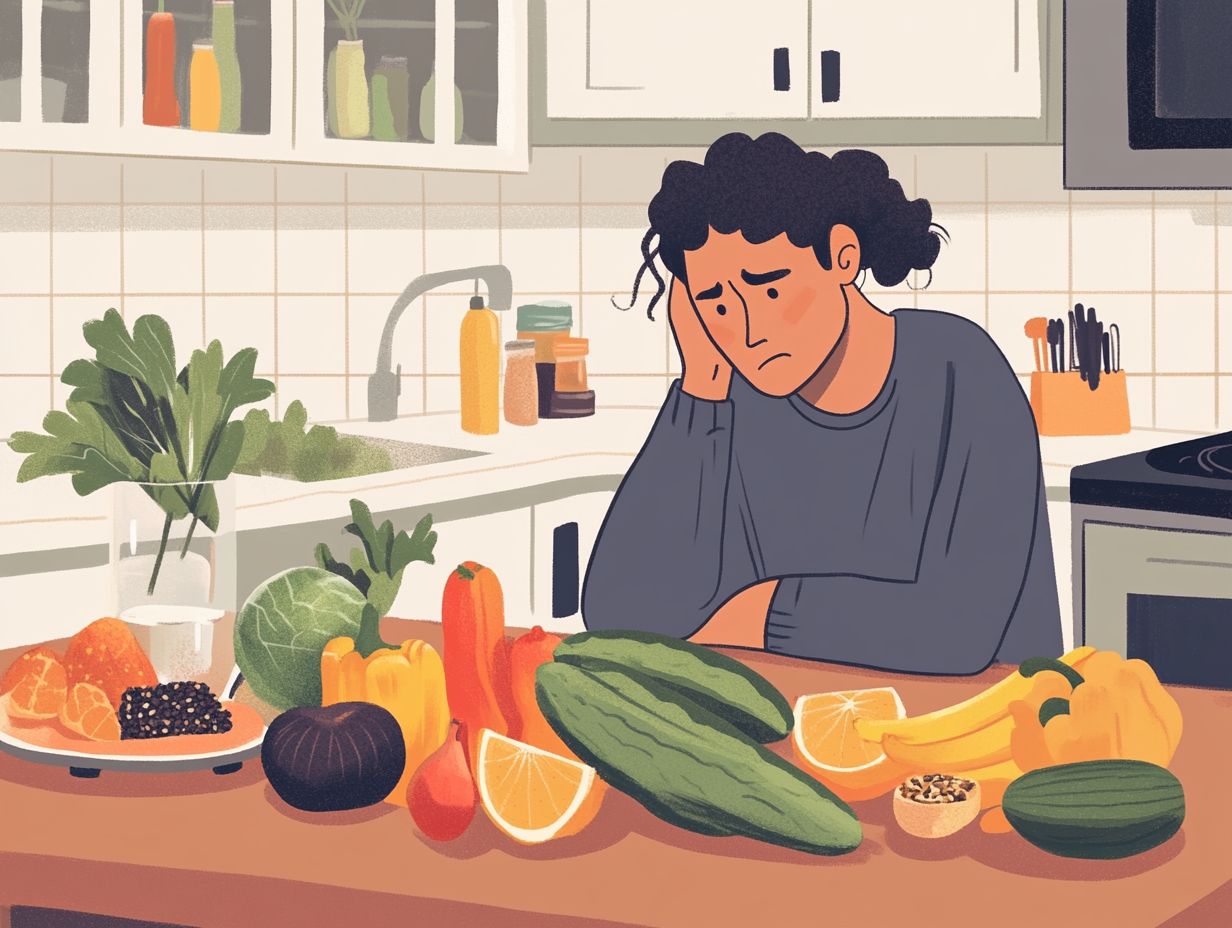 A common mistake among those following a vegan diet is the tendency to overeat healthy foods, mistakenly believing that all plant-based foods are low in calories. This can result in a caloric intake that exceeds desired levels, contradicting weight loss goals and making it challenging to achieve a caloric deficit. When individuals consume larger servings of foods like avocados, nuts, and granola, they may overlook the fact that these items can contain relatively high calories despite their nutritional benefits. This behavior often stems from the desire to maximize nutrient intake but can easily lead to exceeding one’s daily caloric requirements. Being aware of the calorie content of various whole foods can aid in maintaining a balanced diet that supports weight loss goals. Being aware of the caloric content of various plant foods can aid in meal planning and portion control. By being mindful of serving sizes, individuals can enjoy the health benefits of a vegan diet without hindering their weight loss efforts.
A common mistake among those following a vegan diet is the tendency to overeat healthy foods, mistakenly believing that all plant-based foods are low in calories. This can result in a caloric intake that exceeds desired levels, contradicting weight loss goals and making it challenging to achieve a caloric deficit. When individuals consume larger servings of foods like avocados, nuts, and granola, they may overlook the fact that these items can contain relatively high calories despite their nutritional benefits. This behavior often stems from the desire to maximize nutrient intake but can easily lead to exceeding one’s daily caloric requirements. Being aware of the calorie content of various whole foods can aid in maintaining a balanced diet that supports weight loss goals. Being aware of the caloric content of various plant foods can aid in meal planning and portion control. By being mindful of serving sizes, individuals can enjoy the health benefits of a vegan diet without hindering their weight loss efforts.
4. Lack of Planning and Preparation
Poor meal planning and preparation is one of the most common obstacles faced by individuals following a vegan diet, often leading to unhealthy food choices that may hinder weight loss. Without effective meal planning, it becomes easy to overlook essential nutrients and opt for options that lack adequate nutrition, potentially resulting in nutrient deficiencies such as vitamin B12 and calcium deficiency. This is where proper meal planning can play a crucial role in ensuring balanced nutrition and fostering healthy eating habits. Meal planning involves dedicating time each week to outline meals, allowing individuals to select a variety of plant-based dishes that provide sufficient vitamins and minerals. Helpful techniques such as:
- Batch cooking
- Creating seasonal ingredient lists
- Preparing shopping lists
can simplify the process and minimize the risk of falling into unhealthy habits. Incorporating a diverse range of foods keeps meals exciting and can aid in weight loss while promoting sustainable lifestyle changes. When combined with mindfulness and preparation, these strategies can significantly enhance the overall experience of adhering to a vegan diet.
How to Overcome Common Pitfalls on a Vegan Diet?
The most effective ways to navigate the common pitfalls of a vegan diet and achieve successful weight loss include:
- Consuming whole, unprocessed foods
- Ensuring adequate intake of plant-based protein
- Practicing mindful eating and portion control
- Engaging in comprehensive meal planning and preparation
These strategies not only enhance nutrition but also foster sustainable eating habits that are essential for long-term health.
1. Focus on Whole, Unprocessed Foods
Whole, unprocessed foods are more nutrient-dense and beneficial to human health than processed foods, making them essential for anyone following a vegan diet. Consuming a wide variety of whole fruits, vegetables, legumes, and whole grains maximizes fiber and nutrient density in meals, contributing to weight loss and improved health outcomes. This dietary approach often leads to increased energy levels and better digestive health, both of which support a more active lifestyle. It can also help prevent nutrient deficiencies and ensure that essential vitamins and minerals are part of the daily diet. For instance, vibrant foods like kale and spinach are rich in antioxidants and vitamins A, C, and K, while legumes such as lentils and chickpeas provide an excellent source of protein and essential minerals. Whole grains like quinoa and brown rice offer complex carbohydrates that are beneficial for sustained energy release throughout the day. By prioritizing whole foods, individuals can help reduce inflammation and lower the risk of chronic diseases, ultimately enhancing overall well-being and vitality.
2. Incorporate Plant-based Protein Sources
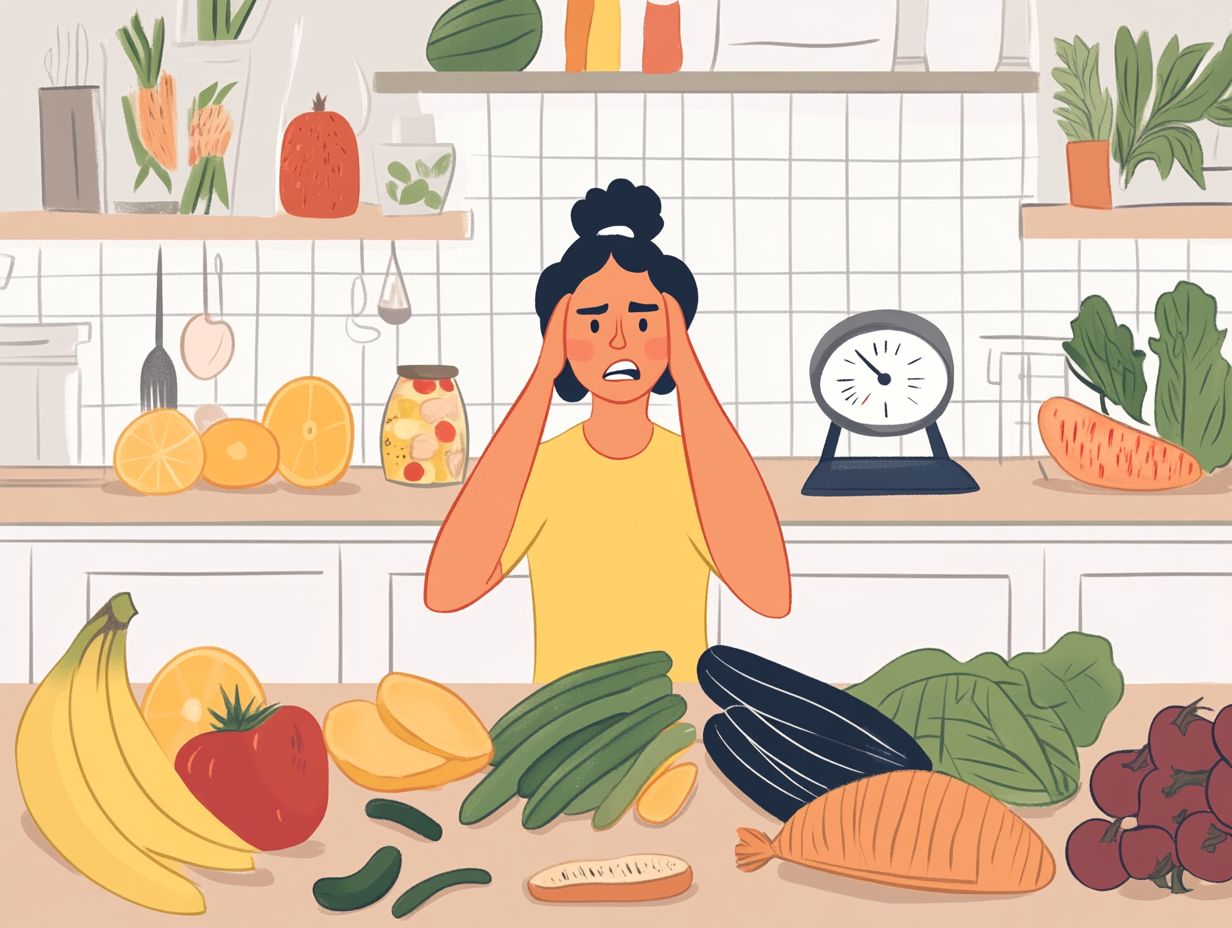 Plant-based diets can meet protein needs effectively when managed well. Diverse plant-based protein sources are essential for vegans to meet their protein intake requirements and ensure they obtain all the necessary amino acids. Foods such as legumes, tofu, tempeh, and nuts contribute to a balanced diet while supporting weight loss and muscle maintenance. Incorporating quinoa, chickpeas, lentils, and seeds like chia and hemp can provide a wide array of nutrients. These foods also supply dietary fiber, vitamins, and minerals that are vital for overall health. Additionally, nuts like almonds are a great source of protein, healthy fats, and other essential nutrients important for maintaining energy levels and muscle health. Research indicates that individuals following a vegan lifestyle can achieve adequate protein consumption by varying their meal options. Including these protein sources can enhance energy levels, promote satiety, and support healthy muscle function, all while being delicious and nutritious.
Plant-based diets can meet protein needs effectively when managed well. Diverse plant-based protein sources are essential for vegans to meet their protein intake requirements and ensure they obtain all the necessary amino acids. Foods such as legumes, tofu, tempeh, and nuts contribute to a balanced diet while supporting weight loss and muscle maintenance. Incorporating quinoa, chickpeas, lentils, and seeds like chia and hemp can provide a wide array of nutrients. These foods also supply dietary fiber, vitamins, and minerals that are vital for overall health. Additionally, nuts like almonds are a great source of protein, healthy fats, and other essential nutrients important for maintaining energy levels and muscle health. Research indicates that individuals following a vegan lifestyle can achieve adequate protein consumption by varying their meal options. Including these protein sources can enhance energy levels, promote satiety, and support healthy muscle function, all while being delicious and nutritious.
3. Practice Mindful Eating and Portion Control
Mindful eating and portion control can facilitate weight loss on a vegan diet by encouraging individuals to pay attention to their bodies signals of hunger and fullness, leading to healthier choices. These techniques can help prevent overeating and foster a greater appreciation for the flavors and textures of whole foods. Additionally, mindful eating can help in better digestion and absorption of nutrients, further promoting overall well-being. Practicing mindful eating by slowing down during mealtimes allows individuals to truly savor and enjoy their meals. Some helpful tips for mindful eating include:
- Using smaller plates to serve smaller portions
- Chewing food thoroughly to aid digestion
- Eliminating distractions such as phones or television while eating
Keeping a food diary can also help individuals identify emotional triggers associated with specific food choices, enabling them to make more intentional decisions. Additionally, incorporating seasonal fruits and vegetables into meals can enhance the enjoyment of eating while supporting a healthy vegan diet.
4. Meal Planning and Prepping
Meal planning and preparation are essential for successfully adhering to a vegan diet, as they enable individuals to create varied and balanced meals while minimizing the risk of impulse eating and assisting with weight management. By engaging in meal prep, individuals can better ensure adequate nutrient intake, avoid potential nutrient deficiencies, and promote a healthy lifestyle. To get started, people can designate a specific day of the week to create a meal plan for the upcoming week, mapping out a menu that includes a variety of food groups, such as legumes, whole grains, fruits, and vegetables, which are rich in essential nutrients and fiber. For instance, a weekly meal plan might feature filling dishes like high-protein meals that include:
- Chickpea curry on Monday,
- Quinoa salad with seasonal vegetables and tofu on Tuesday,
- A colorful stir-fry on Wednesday.
Additionally, meals can be complemented with nutritious snacks, such as carrot sticks with hummus or fruit smoothies, to ensure a diverse range of nutrients like healthy fats and fiber throughout each day. This approach not only enhances the variety of daily meals but also simplifies grocery shopping and cooking, making it easier to maintain a health-promoting vegan diet that supports weight loss and provides health benefits.
What Are Some Other Tips for Successful Weight Loss on a Vegan Diet?
Along with avoiding the pitfalls mentioned earlier, the following tips can help ensure successful weight loss on a vegan diet:
- Drink plenty of water.
- Get enough sleep.
- Exercise regularly.
- Seek professional help and support.
1. Stay Hydrated
 Hydration is essential for good health and can support weight loss on a vegan diet by enhancing metabolism and curbing hunger. Adequate water intake helps in controlling blood sugar levels and prevents dehydration. By drinking enough water throughout the day, you can ensure that your body’s functions operate efficiently and prevent the confusion of thirst with hunger. For those following a vegan diet, proper hydration is crucial for the absorption of nutrients from plant foods. Water aids digestion, facilitating the absorption of essential minerals such as iron, calcium, and omega-3 fatty acids. Additionally, adequate fluid intake helps to eliminate toxins from the body, promotes healthy skin, and improves energy levels, which may sometimes dip due to reduced calorie consumption in a vegan lifestyle. Including hydrating foods such as:
Hydration is essential for good health and can support weight loss on a vegan diet by enhancing metabolism and curbing hunger. Adequate water intake helps in controlling blood sugar levels and prevents dehydration. By drinking enough water throughout the day, you can ensure that your body’s functions operate efficiently and prevent the confusion of thirst with hunger. For those following a vegan diet, proper hydration is crucial for the absorption of nutrients from plant foods. Water aids digestion, facilitating the absorption of essential minerals such as iron, calcium, and omega-3 fatty acids. Additionally, adequate fluid intake helps to eliminate toxins from the body, promotes healthy skin, and improves energy levels, which may sometimes dip due to reduced calorie consumption in a vegan lifestyle. Including hydrating foods such as:
- cucumbers
- watermelon
- leafy greens
can further enhance hydration strategies and allow you to experience the many benefits of a healthy vegan diet.
2. Get Enough Sleep
Quality sleep is essential for weight loss on a vegan diet, as sleep deprivation can lead to hormonal changes that increase hunger and cravings. Adequate sleep helps manage appetite and enhances overall well-being. When the body lacks restorative sleep, it elevates hormones like cortisol, which are associated with increased appetite and poor food choices. Insufficient sleep reduces the effectiveness of leptin, the hormone responsible for signaling fullness, while increasing ghrelin, the hormone that stimulates hunger. This imbalance not only makes it challenging for individuals to stick to a healthy eating plan but also affects the success of their weight management goals. To promote effective sleep and cultivate habits that encourage healthier choices, individuals should prioritize consistent sleep schedules to support their overall physical and mental well-being.
3. Incorporate Regular Exercise
Exercise plays a vital role in enhancing the benefits of a vegan diet by promoting weight loss and improving overall health. It helps create a calorie deficit, reduces stress, and boosts metabolism, all of which are essential components of an effective weight loss plan. Regular exercise, including activities like cardio and strength training, supports heart health and can help reduce the risk of heart disease and cancer. Physical activities such as cardio, strength training, and yoga can complement the nutrients provided by plant-based foods. Incorporating high-intensity interval training (HIIT) into a vegan lifestyle can maximize fat burning in a shorter amount of time. Activities like biking, swimming, and group fitness classes make exercising enjoyable while fostering a sense of community. Additionally, short workouts can easily be integrated into daily routines, such as taking a walk or stretching during breaks, to enhance overall fitness and ensure that the benefits of a healthy diet are amplified through movement.
4. Seek Professional Guidance and Support
Consulting with professionals and seeking support from others can be immensely beneficial for individuals following a vegan diet who wish to lose weight in a healthy and effective manner. This includes understanding potential nutrient deficiencies such as vitamin B12 and ensuring adequate protein intake from sources like legumes, tempeh, and almonds. Nutritionists and dietitians offer personalized consultations to help individuals navigate specific dietary challenges while ensuring they maintain a balanced intake of essential nutrients that may be lower in a vegan diet. They can provide customized meal plans, recommend nutrient-dense foods, and guide individuals on how to meet their protein needs by incorporating legumes, tofu, tempeh, and whole grains into their meals. Additionally, they can assist with strategies for improving iron absorption and addressing calcium deficiency. Additionally, a registered dietitian can teach mindful eating practices and suggest physical activities that align with a person’s dietary choices. In some cases, behavioral therapists may assist those looking to lose weight in overcoming emotional eating or fears related to certain foods. With their extensive expertise, these professionals play a crucial role in helping individuals achieve their weight loss goals and enhance their overall well-being.
